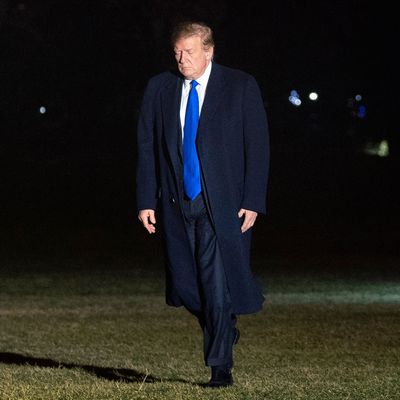
This week, the House Judiciary Committee issued a wide swath of subpoenas investigating corruption by the Trump administration. White House press secretary Sarah Sanders responded with an unhinged statement decrying the “disgraceful and abusive investigation,” the “intimidation and abuse of American citizens,” and calling it a distraction from a “radical agenda of making America a socialist country, killing babies after they’re born, and pushing a ‘green new deal’ that would destroy jobs and bankrupt America.”
As one does when one is innocent and facing an investigation that will definitely not uncover any crimes or wrongdoing.
And yet, rather than signaling its obvious terror at being held accountable, the administration’s response has been taken at least half-seriously as a messaging strategy. “The extensive scope could bolster claims by Trump and Republicans that congressional Democrats are seeking to undermine the president and cripple his 2020 reelection effort rather than conduct a disciplined, fact-finding inquiry,” reports a Washington Post news story, “the missives raised questions about the scope of Democrats’ inquiry.”
An massive inquiry into a historically corrupt administration raises questions about … the Democrats? Somehow the strange idea has taken hold that investigating Trump’s wrongdoing could benefit him. The odds of this are exceedingly slight.
When observers express the possibility that Democrats could overreach and help Trump, they have in mind something like a replay of congressional Republican oversight. Republicans spent years barking at the moon on Benghazi in a failed attempt to substantiate a conspiracy theory, to the point where the mainstream media stopped taking their efforts seriously. (Notably, Republicans themselves did not deem this effort a failure: House Republican Majority Leader Kevin McCarthy credited the Benghazi probes with lowering Hillary Clinton’s approval rating in advance of the election.)
But even if we concede that overreach would backfire, it is difficult to imagine how Democrats could overreach if they wanted to. The scale of illegality and corruption they’re exploring is orders of magnitude larger than anything in modern history. Enormous new scandals are popping up almost daily. In the last week alone, we’ve learned that President Trump overrode intelligence assessments and his own chief of staff to give high-level security clearances to his daughter and her husband, who have mingled public diplomacy with their own personal business dealings; that Trump tried repeatedly to direct the Justice Department to block a merger in order to punish CNN for independent reporting; that the Trump Organization is being investigated for insurance fraud; in addition to multiple allegations presented by Michael Cohen, many of them backed by contemporaneous evidence. For a normal presidency, any of these allegations would, on their own, present crisis-level scandals.
Overreach? It would take Congress decades just to keep pace with all the crimes.
But maybe the public doesn’t believe Trump is a criminal, or that he’s corrupt. And maybe somehow shoving tons of evidence that he is into the news cycle will fail to move voters, who will be left with the assumption Democrats are hounding Trump unfairly. Maybe, right?
Well, no. Quinnipiac polled many of these questions. “If President Trump refuses to release his tax returns, do you think that Congress should investigate the situation, or not?” Fifty-seven percent say yes, 38 percent say no. “Do you think that Congress should do more to investigate Michael Cohen’s claims about President Trump’s unethical and illegal behavior, or don’t you think so?” Fifty-eight percent say yes, 35 percent say no. “Do you think that President Trump committed any crimes before he was president, or don’t you think so?” Sixty-four percent say yes, 24 percent say no.
Less than a quarter of the public thinks Trump did not commit crimes. That’s bad.
But do the voters care? Yes, they do. The recent Gallup poll shows handling “corruption in government” rates as Trump’s worst issue (37 percent think he’s handling this well, compared to 60 percent who think he isn’t).
Corruption is Trump’s greatest political liability. It’s the skeleton key to unlock his connection to Obama voters who gave him a chance because they thought he was an outsider. Corruption is the simple explanatory device that shows that Trump is not out to save the country, he’s out to make money for himself and his rich buddies. Almost everything he’s done, including his shady ties to Russia, fall into that category. These misdeeds also happen to be massive violations of the public trust, running afoul of everything from the Emoluments Clause to the federal tax code.
Trump is lashing out wildly at the investigations because he is very afraid of what they will yield. The last people in the world who should feel nervous about the political ramifications are the Democrats in Congress.






























